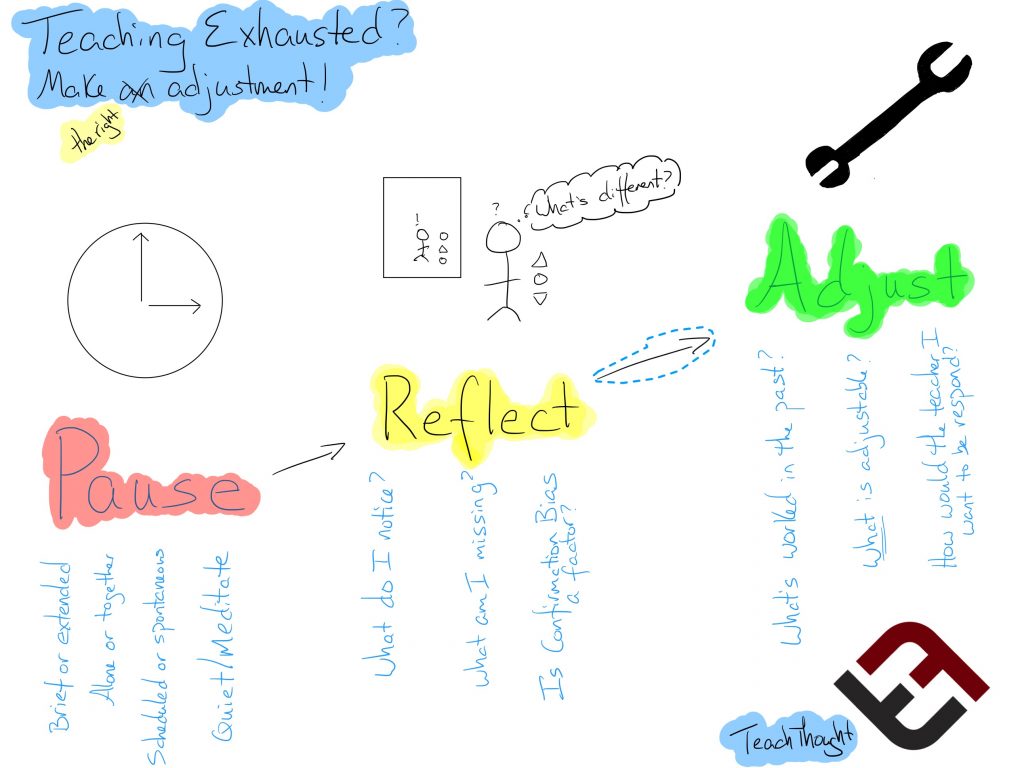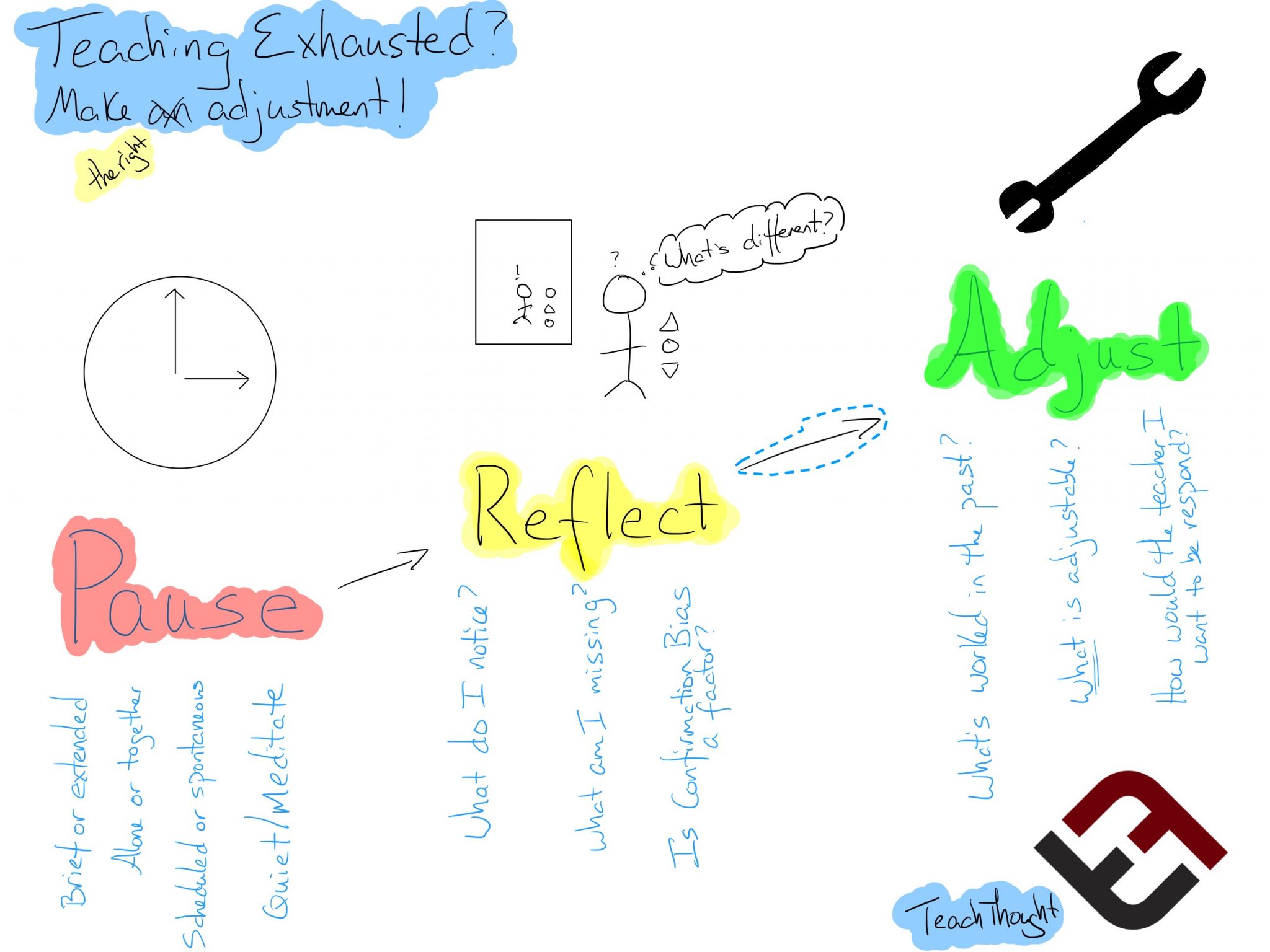Pause, Reflect, And Adjust: A Strategy For Teacher Well-Being
It took a few days for me to really shake off the effects of that week, and knowing my classroom was making me feel bad was an awful feeling.

Teaching Exhausted? Pause, Reflect, And Adjust
contributed by Rachelle Dene Poth
Teaching can be exhausting.
There are so many tasks involved each day, trying to keep up with everything can be challenging. Each new school year seems to bring an increase in tasks, initiatives, time seems to evaporate, and it can be mentally and physically exhausting some days.
Some days you may have even question why you are in education—feeling like you are ready to throw in the towel. Is it all worth it?
The truth is, these feelings are natural and could be said about any job or profession. Every ‘job’ has its trying moments. In our work and in our lives, we all face challenges. Each day brings new opportunities and struggles alike, and even with a positive attitude, clear plans, and a growth mindset, but sometimes it doesn’t feel like enough and we falter.
But we return anew, we start each day fresh, with hope.
See also The Basics Of Reflective Teaching: A Slo-Blog Approach
Experience Isn’t Always Enough
One would think that with each passing year, it might get easier, but I don’t find that to be true.
I remember back when I was in school, you could tell which teachers stayed late or came in early and were fully invested in teaching and their students. I can recall those teachers who were always eager to lend an ear if you needed to talk, or stay after class or school to explain something to you over and over until you got it.
And chances are, some of these teachers were also the ones that were not afraid to let you have it if you bent the rules. Even with the evolving roles of teachers today, things are not that different in terms of teacher and student relationships.
Pause for a moment and think about your school, your colleagues, and yourself. What kind of teacher are you?
What kind of teacher do others think you are—how are you ‘seen’ in your building? And how do you see others?
Are you invested in teaching and your students? Do you feel exhausted at the end of the day? When you pause and reflect on the drive home every afternoon, what do you notice about yourself and your practice?
Why Reflection Matters
What you notice and don’t notice is as important as pausing and taking the time to reflect to begin with.
A crucial part of learning is reflection, and teaching is, ironically, grounded in learning. John Dewey said, “We do not learn from experience…we learn from reflecting on experience.” This is not something that I personally had always done, but over the last few years it has become a catalyst for my growth as a teacher.
Why? Because it’s informative for evaluating the methods being used in class and the impact these methods are having on the students. But more importantly, it helps to bring focus to the impact of my interactions with and responses to students as well. My goal is to do the best that I can, and part of that is to think about what I could have done differently and if different would’ve been better.
Driving home I think, “If I could start the day over again, what would I do differently and why?”
See also Why Good Teachers Quit
Classroom Management Struggles Can Exhaust You
At some point, we all deal with behavior issues in the classroom.
Whether they are minor issues such as students speaking out and interrupting lessons, or other more disruptive behaviors that bring the teaching and learning grinding to a halt, classroom management problems can cause teaching exhausted for you.
As a teacher, I will not tolerate anything that takes away the learning potential of other students.
I also do not like to raise my voice or visibly show that I might be upset or can be angered by a certain behavior. I am keenly aware that my reactions could disrupt learning as much or more than whatever student behavior elicited that response. Over my 24 years as a teacher (21 in my current school), I can remember having lost my composure—and thus the leadership of my class—fewer than ten times.
At first, that may be considered a good thing, but as I reflect I wonder if that’s true. Last week, I had a conversation in which a colleague, referring to me, tried to make a point by asking a student, “Do you know how many times she has written someone up in the past few years? Zero!”
And that statement has really led me to think over the past few days about how I have handled behavioral issues and discipline in my classroom. I would like to think that the number is zero because I have implemented alternative methods of resolving any issues such as conversation or restorative practices.
Or could it be that I tolerate different behaviors and by doing so, I myself am interfering with the opportunity for students to learn by allowing disruptions to continue that I should instead be addressing? I was left wondering what I had been missing. Had I failed my students by not taking control during times of disruption in the classroom?
I had paused and reflected, and didn’t like what I saw.
Admitting Moments of Weakness
This past week was probably the most trying that I’ve had in the last couple of years. At one point, I even felt like giving up.
Although I love what I do and look forward to getting into my classroom each day and working with the students, I had reached a point where I felt powerless. It honestly felt like I didn’t know what to do, and that’s a helpless feeling. I could not find a way to resolve some of the issues in the classroom full of the students that I’ve been entrusted with.
I’ve always wanted my classroom to be a place students want to be—where they are safe and curious and comfortable. I want the students to work on relationships and push through challenges together while I do whatever it takes to help them grow along the way.
But last week, my classroom was anything but. I had issues with disrespect. Students were speaking out while other students were talking—and when I was talking, too. Students outright ignored my instructions, even refusing to respond to me when speaking directly to them, turning their head away and mumbling under their breath.
There was also an increase in the use of inappropriate language, negative comments being made about the lesson or directed at other classmates.
I have noticed it more over the previous few weeks as I reflected daily, and with each episode, I tried to work closely with each student involved.
Although I was offended and even angry at times, I knew I had to be patient and to keep working to build those connections that we know make a difference. And I only knew this because I paused and reflected.
Though I had responded each time I confronted a challenge, I now knew it was time to make some significant adjustments to my teaching.
Adjusting My Teaching & Growing Forward
It took a few days for me to really shake off the effects of that week, and knowing my classroom was making me feel bad was an awful feeling. Imagine how the students experienced it! In hindsight, I could see that though I didn’t initiate the negativity, I kept it going throughout the day and brought it home with me, too.
I had been keeping that exhausting negativity alive.
So I am reflecting because I need to learn from this experience—know what it looks like when it is barely perceptible. Warning signs. What causes it. What seems to work and what doesn’t seem to work.
Pause.
Reflect.
Adjust.
I know I can do better because I normally do better. The students deserve an efficient, fair, understanding, efficacious, and even professional response from me. This will help provide a comfortable place to be classroom I want while also providing for them a model for resolving challenges and moving forward.
And I’ll have the energy to make it all happen because I started the process in the first place: Pause, reflect, adjust.
In the next post, I will share more reflections, and specific examples of how I handled different situations that sometimes seemed to come out of nowhere.
Teaching Exhausted? Pause, Reflect, And Adjust
